Home | Front Page | Index | Blog | New | Contact | Site Map
Belleville
Food
Flowers
People
Grand Museums
Museums in Homes
Major Churches
Less known Churches
Former Churches
Small Churches
Statues, etc
Streetscapes
Modern Buildings
Les Gares
Fontainebleau
Roland Garros
Visitors
Sorority Time
EU Constitution
Seminars
Neuf Telecom
Tout Paris
Foto Show
Paris 1999
Paris 2005
Paris 2007
France 2007
Paris 2008
France 2008

Travel 2005
Berlin
Paris
Moscow
Russia
Athens
Travel 2004
Mexico 2004
Belize
Guatemala
Honduras
Costa Rica
Panama
Colombia
Ecuador
You can read other people's stuff about Paris in
Paris France,
Paris Guide,
Le Monde, and
Le Figaro.
For info on trains try SNCF
and Radio/TV: RFI | TF1 |
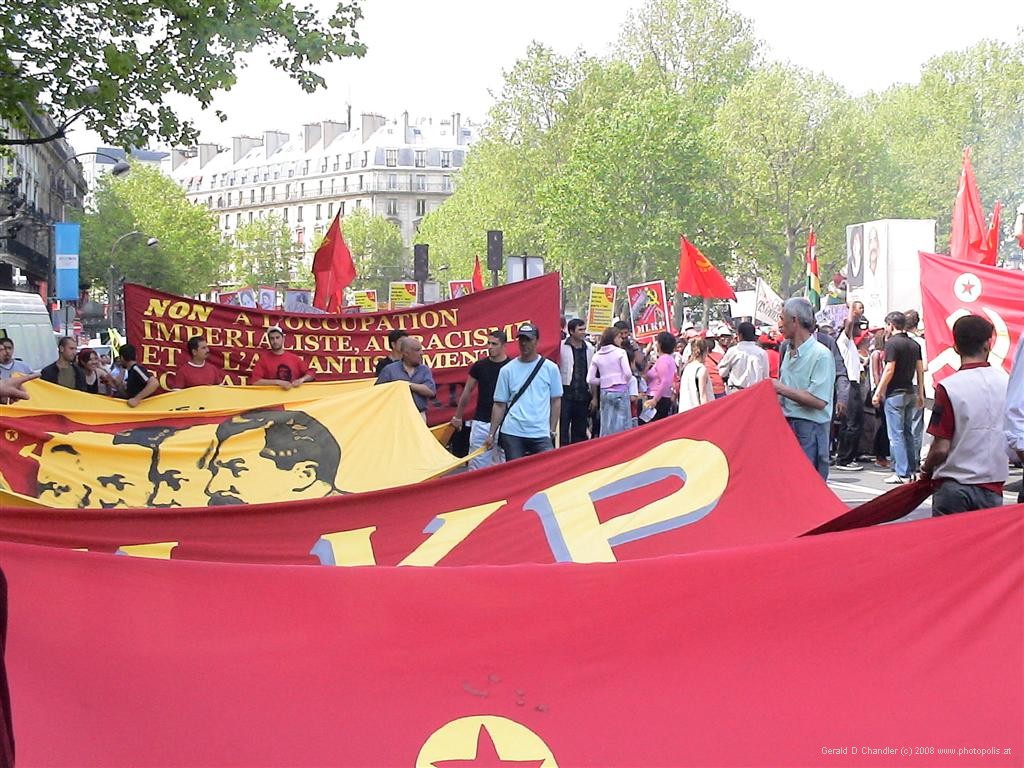
May Day Parade Clamoring for the Non
|
During our stay in Washington DC, we spent lots of time attending talks about a variety of political and social issues. Being the hub of the US federal government it wasn't hard to find such things. We wondered on our arrival in Paris if we would find anything like that here. Well, we did, but not exactly of the Washington kind.
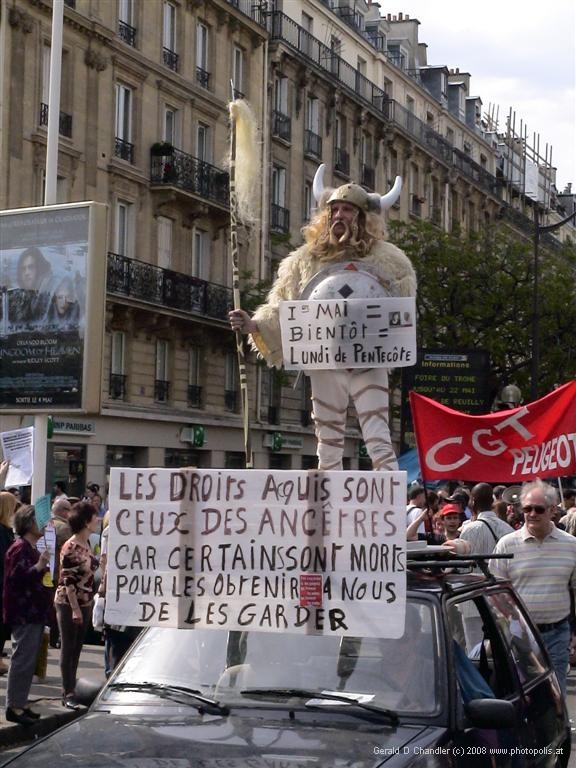
More Mayday Parade |
First of all, we arrived at a very opportune moment, just as the campaign for the referendum on the European constitution was starting in earnest. Our first exposure to the campaign was via the television news of course, with polls being issued weekly on the relative strengh of the Non and the Oui. Next came the political discussion shows. And finally, we started to find public meetings all over Paris that we started to attend. We didn't care much what side of the issue was being emphasized, we just wanted to get to know the people involved and learn about the arguments on each side.
French TV news, at least the broadcast kind which is all we had access to, is more than a little biased in favor of the government. The President of the Republic can decide at very short notice to appear on TV and his wish is always granted and the appearance is always on his terms. So we saw him several times as well as most of the French government giving speeches or being interviewed at one time or another about the referendum. We were lucky not to have jobs to go to because although the President of France got to appear in prime-time (usually around 8 p.m.) all of the interesting discussion shows seemed to start around 11 p.m. and to go on until one o'clock in the morning!
There are two main political discussion shows that we watched, both hosted by fifty- something women, and both fairly similar in style. One always had round-table discussions involving four to eight guests, the other had a rather strange set designed to look like a train and called "France-Europe Express" but also had from four to six guests at a time. On these shows the deck was more evenly stacked. They always had pretty even representation from each side in the campaign. What was unusual was the extent to which the debate became heated. Guests would interrupt each other, voices would be raised, the moderator tried to shout down her guests complaining that the poor viewer couldn't hear anybody if they insisted on all talking at once. Nobody listened to her. At first we found it somewhat amusing, but in the end it just became wearing as it was always the same people who wouldn't shut up.
You should remember that both sides had rather unholy alliances. The Non was supported by the trotskyists, the communists, and a little more than half of the socialists but also by the racist nationalists and the supremacists, those wanting the return of the franc, more glory for the French nation, and especially less immigration and definitely no entry into the EU for Turkey. The former claimed to be pro-European (but only a Europe that was socialist rather than capitalist), the latter clamored for a return to a Europe of nation-states.
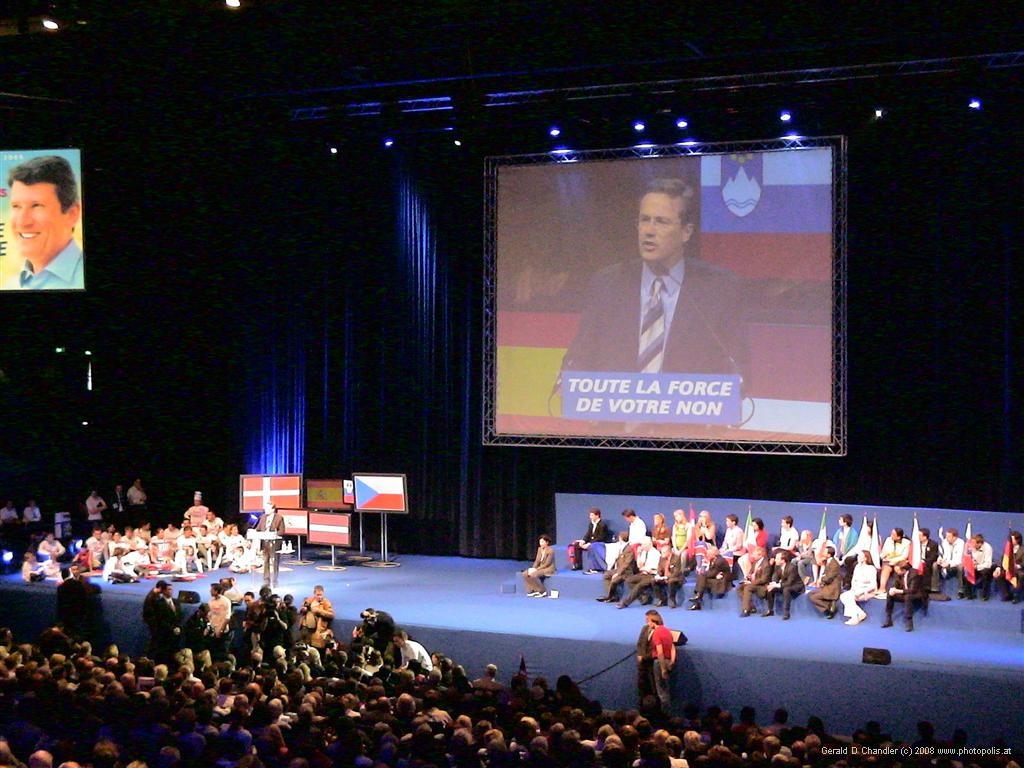
De Villiers Rally |
On the Oui side, were the rest of the socialist party which might be described as non-revolutionary and the parties that broadly supported the government and more liberal economic policies than the socialist party. The small green party was evenly split between the Non and the Oui. Both the socialist party and the greens had held an intra-party vote before the referendum to decide what the party line should be and both had voted with somewhat large majorities for the Oui. That didn't stop a large number of party members, and of course voters, from breaking with the party line and not only voting but actively working for the success of the Non.
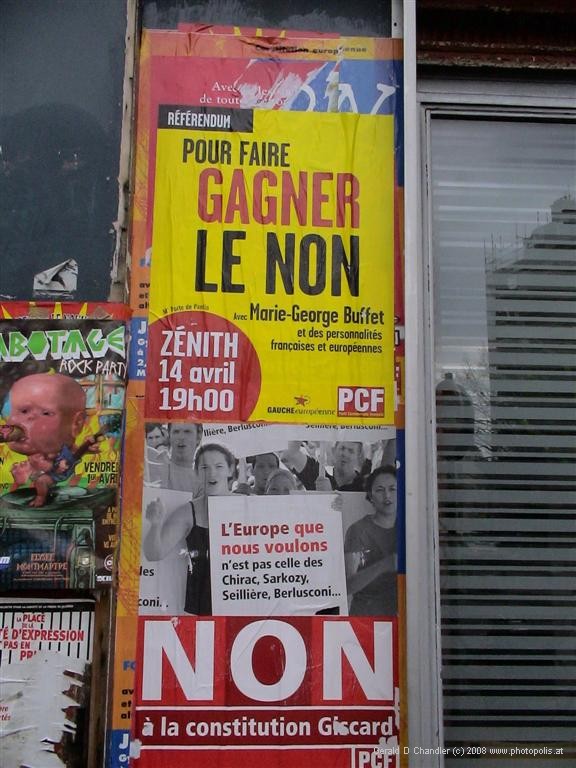
Posters for the Non |
Before the campaign got underway, the Oui seemed to be solidly ahead. But when the second in command of the socialist party, former prime minister Laurent Fabius broke with the party and said he would not only vote Non but would campaign for the Non, things started to change.
The revolutionary left took the line that the European Union was a great idea but was too influenced by Anglo-Saxon liberal economic policies (i,e,, British and American) and that the consitution didn't do enough to protect and project the social policies that French people demanded.
The supremacist right said that too many decisions were being made in Brussels and that it was time to return government of the French to the French and in particular control of the nation's borders to prevent illegal immigration. Both groups complained loudly about the lack of work and both argued directly or indirectly for a greater measure of protectionism.
The left wanted to spend more money on direct aid to the new members so that they wouldn't drag down wage levels, the right wanted to put back customs and other trade barriers.
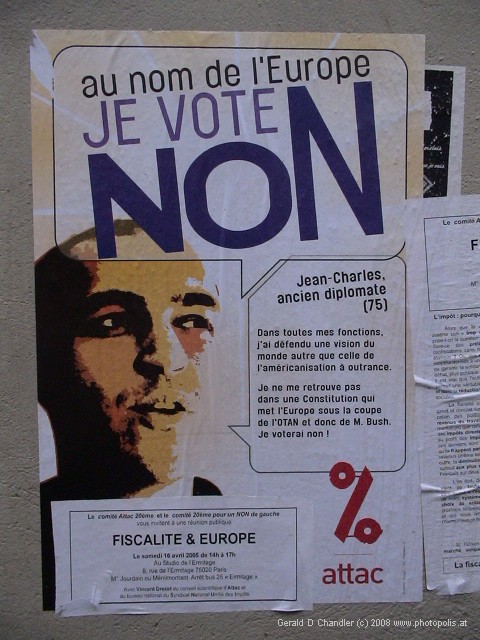
Save Europe from Bush and America |
In answer to the cacophony on the Non side, the Oui-ouistes had their own problems. They all tried not very successfully to say that while imperfect, the treaty was the best you could get given the make-up of the European Union. The socialists tried to suggest that they had created a beachhead for French-style social protections (right to work, unemployment protections, etc.) and that in the future they could perhaps be improved. The presidential party on the other hand could only argue that the new treaty was good for France because it increased its share of the vote in majority voting situations and gave the founding members almost fifty percent of the vote and that without the constitution Europe would not be able to resist the (economic) onslaught of the Americans and the Chinese. That didn't exactly inspire anyone. Subtext for the Oui side was also that their opponents were virulently critical of the government and the socialists wanted to avoid at all costs defending the president and his prime minister Jean-Pierre Raffarin with a presidential election coming up in only two years, while the presidential party wanted at all costs to try and avoid the vote becoming a referendum not on the European Union but rather on the economic policies of the government. In case you don't know, France has been suffering from 10% unemployment for at least 15 years and the government has been unable to reduce it.
As you no doubt know the Oui failed and in the process provided Gerry and me with lots of entertainment. We went to about half a dozen different meetings. The smallest was about a block from our apartment in a small cafe-restaurant attended by about 50 people. The largest was at a sports hall, called the Palais des Sports attended by 5,000. Both happened to be rallies for the Non, the former was left-wing, the latter right wing. We found it harder to find gatherings for the Oui side, but did get to one such meeting at which former head of the European Commision Jaques Delors spoke along with members of parliament from both sides of the aisle. The fervor was all on the side of the Non. Why? Because successive French governments have made Brussels a bit of a bogeyman for the French citizen. Having been so critical for so long it was hard to turn around now and praise it to the skies. Nobody wanted to really admit that the opposition was right, that the European Union was a more liberal economic association than most French people would like and explain why they should vote for it. Support was lukewarm, opposition was ferocious, hardly surprising that the opposition won.
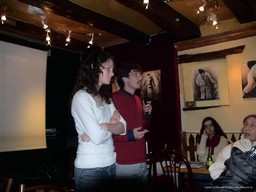
Trotskyists for No |
As supporters of the war to liberate Iraq from the dictatorship of Saddam Hussein, we have been delighted since the vote to see Chirac's popularity rating plummet to 24%. Gerry constantly wonders if it will soon fall below Bush's rating in France! We have also watched with amazement as the French government hammers away at Tony Blair for wanting to negotiate an end to agricultural subsidies in exchange for the end to the British rebate (first granted to Margaret Thatcher's government) loudly demanded by Chirac. Blair doesn't say he won't talk about the rebate, but he does say he will only talk about it in the wider context of a complete review of the European budget, 40% of which is devoted to agriculture. Once again, we find that French TV has a hard time defending the French government on this issue and does it by sleight of hand, separating the two issues (agricultural subsidies and British rebate) as if they were not intimately related. The Franco-German alliance is in particularly bad shape with Gerhard Schröder facing a very tough general election later this year. Oh what fun!
In sum, the constitution didn't have enough pluses. No-one seemed interested in the idea of having a European foreign minister, or even a first among equals European President. The economic fears of the French people trumped all of the technical issues like voting percentages. And even incorporating the Declaration of Human Rights into the treaty wasn't enough to placate those militating for a "social Europe". Someday we expect that there will be more political integration, but it won't happen yet for a while and maybe that's as it should be. Even Turkey might come out of it a winner. As a Turkish citizen of France told us: by the time a decision is made on its entry, Turkey will already have changed so much of its legal and social infrastructure that its citizens will enjoy a European lifestyle even if it never becomes a member of the Union.
Vive la France et vive la politique!